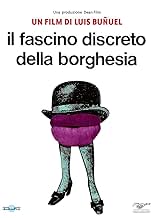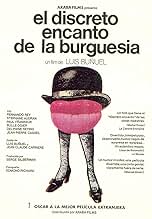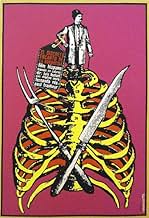The Discreet Charm of the Bourgeoisie
Original title: Le charme discret de la bourgeoisie
IMDb RATING
7.8/10
48K
YOUR RATING
A surreal, virtually plotless series of dreams centered around six middle-class people and their consistently interrupted attempts to have a meal together.A surreal, virtually plotless series of dreams centered around six middle-class people and their consistently interrupted attempts to have a meal together.A surreal, virtually plotless series of dreams centered around six middle-class people and their consistently interrupted attempts to have a meal together.
- Won 1 Oscar
- 7 wins & 9 nominations total
Stéphane Audran
- Alice Sénéchal
- (as Stephane Audran)
- Director
- Writers
- All cast & crew
- Production, box office & more at IMDbPro
Storyline
Did you know
- TriviaThe movie includes three of Luis Buñuel's recurring dreams: a dream of being on stage and forgetting his lines, a dream of meeting his dead cousin in the street and following him into a house full of cobwebs, and a dream of waking up to see his dead parents staring at him.
- GoofsAfter Rafael gives the terrorist champagne, his position in the chair changes between shots.
- Quotes
Rafael Acosta: You're much better suited for making love than for making war. Vamos, muchacha. Vamos.
- ConnectionsFeatured in Pour le cinéma: Episode dated 16 September 1972 (1972)
Featured review
I'll be honest, I mostly like my movies to be conventional which simply means to me that they should have a beginning, middle and ending, plus a credible plot and believable characters. I've never cottoned on to the cinema of the surreal or the absurd and have always thought you can keep all that Coen Brothers or Pedro Almodovar stuff away from my door.
But, I live in Spain now and I have a learned Spanish neighbour who has encouraged me to watch some Spanish cinema particularly the films of Bunuel and so a few months ago I made a point of watching his earlier work "Viridiana" which I very much enjoyed and deciding to dip into his repertoire again, selected this particular movie, even if it was produced in France, as it seems to be his best known and perhaps most celebrated work. So glad I did.
Did I perceive every nuance of the director's intentions? Probably not. Did I understand the bigger arguments he was making, which to be fair is pretty much all there in the title? I think so though I can't be sure. Was I kept watching all the way through down to the delicious combination of intrigue, amusement and curiosity? Absolutely!
The narrative is simple. Three male-female couples want to sit down to dinner in modern-day France. The males are all in some way connected to the governance of an imaginary French protectorate in South America called Miranda with the most prominent among them being Fernando Rey as the country's ambassador, but all six are of the distinctly upper class set.
But don't be fooled into thinking that these suited and booted individuals are pillars of society. Far from it. As well as apparently having designs on each other's wives we also see that the three men are involved in the illegal trafficking of heroin.
It seems that every time they sit down to eat, an ever more bizarre outside intervention takes place before they can put the food to their lips. Much later Bunuel interjects into the narrative the dreams of a young French army officer who just happens along and then the daydreams of the lead characters themselves some of which in fact overlap the dreams of the others. Some of these are eerie, while others are comical.
If pushed, yes I can see the film attacking the governing elite, here shown as corrupt and without morals, but it's more the individual scenes that stay in the memory such as the shocking sequence when the local bishop, who joins the group, oddly enough as a gardener, later cold-bloodedly shoots dead an already dying man after he learns that years ago the man was the never-caught killer of his own parents or when the six are slaughtered Romanov-style by presumably Miranda freedom-fighters near the end.
But I also love the comic touches like when the group discover themselves playing themselves on stage in front of a baying audience, or when an important telephone conversation is drowned out by the sound of aircraft flying overhead in an almost Woody Allen-type moment. The funniest of many in the film for me was the sight of Ray's character giving himself away to the Miranda assassins by reaching up to the table under which he is concealed for a piece of duck he's waited all movie-long to taste.
Listen, don't ask me to write an essay on this film. All I know is that I found it very original, entertaining and funny in equal measure. A moveable feast in fact.
But, I live in Spain now and I have a learned Spanish neighbour who has encouraged me to watch some Spanish cinema particularly the films of Bunuel and so a few months ago I made a point of watching his earlier work "Viridiana" which I very much enjoyed and deciding to dip into his repertoire again, selected this particular movie, even if it was produced in France, as it seems to be his best known and perhaps most celebrated work. So glad I did.
Did I perceive every nuance of the director's intentions? Probably not. Did I understand the bigger arguments he was making, which to be fair is pretty much all there in the title? I think so though I can't be sure. Was I kept watching all the way through down to the delicious combination of intrigue, amusement and curiosity? Absolutely!
The narrative is simple. Three male-female couples want to sit down to dinner in modern-day France. The males are all in some way connected to the governance of an imaginary French protectorate in South America called Miranda with the most prominent among them being Fernando Rey as the country's ambassador, but all six are of the distinctly upper class set.
But don't be fooled into thinking that these suited and booted individuals are pillars of society. Far from it. As well as apparently having designs on each other's wives we also see that the three men are involved in the illegal trafficking of heroin.
It seems that every time they sit down to eat, an ever more bizarre outside intervention takes place before they can put the food to their lips. Much later Bunuel interjects into the narrative the dreams of a young French army officer who just happens along and then the daydreams of the lead characters themselves some of which in fact overlap the dreams of the others. Some of these are eerie, while others are comical.
If pushed, yes I can see the film attacking the governing elite, here shown as corrupt and without morals, but it's more the individual scenes that stay in the memory such as the shocking sequence when the local bishop, who joins the group, oddly enough as a gardener, later cold-bloodedly shoots dead an already dying man after he learns that years ago the man was the never-caught killer of his own parents or when the six are slaughtered Romanov-style by presumably Miranda freedom-fighters near the end.
But I also love the comic touches like when the group discover themselves playing themselves on stage in front of a baying audience, or when an important telephone conversation is drowned out by the sound of aircraft flying overhead in an almost Woody Allen-type moment. The funniest of many in the film for me was the sight of Ray's character giving himself away to the Miranda assassins by reaching up to the table under which he is concealed for a piece of duck he's waited all movie-long to taste.
Listen, don't ask me to write an essay on this film. All I know is that I found it very original, entertaining and funny in equal measure. A moveable feast in fact.
- How long is The Discreet Charm of the Bourgeoisie?Powered by Alexa
Details
- Release date
- Countries of origin
- Official site
- Languages
- Also known as
- Diskretan sarm burzoazije
- Filming locations
- Production company
- See more company credits at IMDbPro
Box office
- Budget
- $800,000 (estimated)
- Gross US & Canada
- $82,471
- Opening weekend US & Canada
- $6,075
- Jun 26, 2022
- Gross worldwide
- $103,230
Contribute to this page
Suggest an edit or add missing content

Top Gap
By what name was The Discreet Charm of the Bourgeoisie (1972) officially released in India in English?
Answer




































